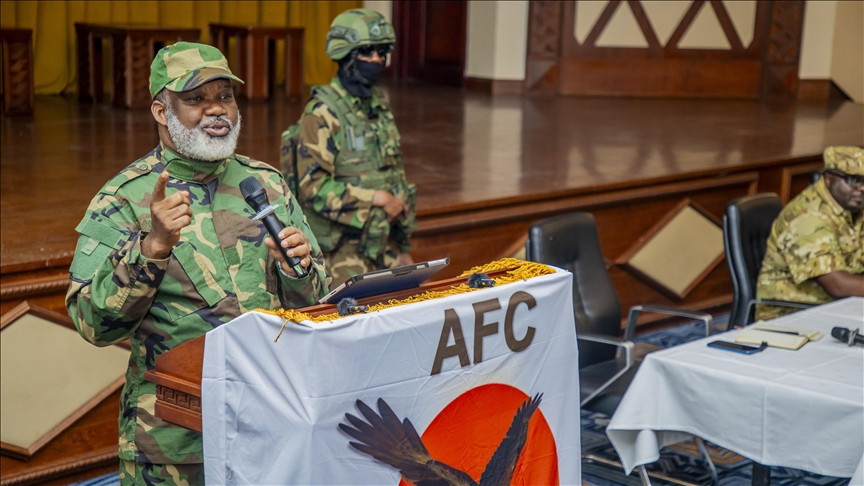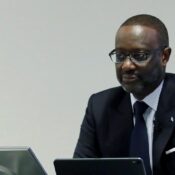
M23 rebels claim that the Congolese army coalition’s position is postponing their withdrawal from Walikale in the DR Congo crisis
The repositioning of the Alliance fleuve Congo (AFC/M23) rebellion’s forces in the area is being delayed since, in contrast to what was previously declared, the Congolese army (FARDC) and its coalition forces have not removed their attack drones from the town of Walikale.
Early on Monday, March 24, rebel spokesperson Lawrence Kanyuka posted on X to draw attention to this, saying: “It should be emphasized that this act constitutes a major obstacle to compliance with the ceasefire and thus compromises ongoing peace initiatives.” Hours before the second joint meeting of the heads of state and government of the Southern African Development Community (SADC) and the East African Community (EAC) was about to take place to discuss the security situation in eastern Democratic Republic of the Congo, Kanyuka made his statement.
The rebel movement announced on March 22 that it “decided to reposition its forces from the town Walikale” in North Kivu Province, which it seized on March 19. This move in accordance with a unilateral ceasefire announced on February 22 and to support peace initiatives aimed at fostering conditions conducive to political dialogue and addressing the root causes of the conflict in eastern DR Congo.
On January 27, the rebels took control of the town of Walikale, which is located roughly 130 kilometers northwest of Goma, the provincial capital of North Kivu. The rebels had advanced so quickly this year that it was the furthest west they had gone. For many years, Walikale has served as a stronghold for the FDLR, a terrorist group located in the Democratic Republic of the Congo that was established in the middle of the 2000s by the surviving leaders of the 1994 Rwandan Genocide against the Tutsi.
By incorporating the group’s combatants into its national army, particularly in the elite presidential guard brigade, the Congolese government has purposefully downplayed the existential threat posed by the genocidal militia, whose deadly ideology has wreaked havoc across the nation and the Great Lakes region.
The Congolese army coalition, which includes hundreds of European mercenaries, the Rwandan genocidal militia, a group of Congolese militias known as Wazalendo, thousands of Burundian troops, South African-led SADC forces, and UN peacekeepers, has threatened to automatically reverse this decision if it provokes or relaunches attacks against the civilian population, including in rebel-liberated areas “and our positions,” the rebels warned on Saturday.
For the Rwandan genocidal militia, Walikale served as a crucial commerce center.
Gaston Iyamuremye, also known as Byiringiro Victor Rumuli, 77, the president of the genocidal militia, had his major headquarters in the area where many genocide fugitives are thought to have flourished. Some might have been captured due to the rebel advance in the area, while others were compelled to flee and move farther inland in different directions.
Walikale territory, the province’s largest, is bounded to the north by Lubero territory, to the east by Rutshuru and Masisi territory, to the west by Tshopo and Maniema Province, and to the south by South Kivu Province.
The murderous militia reportedly controlled primarily remote forests and mining sites that were manually and illegally exploited under its own system of government.
In 2021, the most recent conflict between the M23 rebels and the Congolese army coalition began.
Due to a number of the Congolese government’s shortcomings, particularly Kinshasa’s inability to carry out a peace deal reached on March 23, 2009, the M23 was established on May 6, 2012. The Congrès national pour la défense du people (CNDP), a former political-military organization that had been established roughly three years prior, put an end to the uprising in January 2009 after Kinshasa pledged to incorporate its members into the national army, among other things.
Leading government figures, including former defense minister Charles Mwando Simba, who died in Belgium in December 2016, attended a ceremony welcoming the first 50 rebel soldiers into the national army at the Rumangabo military camp, located roughly 45 kilometers north of Goma, the provincial capital of North Kivu.
Mwando, who was clearly pleased, said during the ceremony, “I note the act of integration of CNDP forces as well as Pareco into the armed forces and I congratulate you.”
The current minister of external commerce, Julien Paluku, who served as governor of North Kivu Province from January 2007 to February 2019, called it “a big day for the Province of North Kivu” and congratulated everyone for their efforts to bring peace to the area.
Paluku declared, “We all gain from peace; nobody gains from war.”
After their fighters were incorporated into the national army, CNDP executives a few days later declared “the de facto transformation of CNDP into a political party,” which was acknowledged by the government.
However, by the end of the year, around eleven months after saying “no” to insurrection and forming a political party, everything had returned to normal.
Désiré Kamanzi, the disgruntled leader of the former rebel group that had evolved into a political party, quit at that time.
“We asked that a regular national monitoring committee be held, but this was in vain,” Kamanzi said, adding that “the fundamental reasons are, notably, the slowness in implementation of the agreements we have signed with the government since January.”
Only three sessions, one in Kinshasa and two in Goma, had taken place, according to Kamanzi, and only at the request of foreign facilitators.
“I became aware that it was becoming a major source of frustration for me personally.”
M23 is currently a member of the Alliance fleuve Congo (AFC), a broader and steadily expanding rebel group that was established in December 2023.
Following an awareness-raising drive by the new leaders of North Kivu Province, up to 100 young people from Bweremana, in the Bahunde chiefdom of Masisi area, “expressed their desire to join” the rebel movement on March 17.
While fighting the AFC/M23 rebels, a large Congolese army coalition supported by Western nations like Belgium and made up of Burundian forces and Rwandan genocidal militia exacerbated the security situation.
Alliance fleuve Congo is fighting for governance that upholds fundamental human rights, protects all Congolese residents, and tackles the underlying causes of conflict under the leadership of Corneille Nangaa, a former chairman of the country’s national election commission. Among other evils that are pervasive in DR Congo, the insurgency has pledged to eradicate corruption, nepotism, tribalism, and the FDLR’s philosophy of genocide.
stated on Sunday that 16 years have gone by since the CNDP and Kinshasa signed a peace deal on March 23, 2009, “without the root causes of the conflict being truly addressed.”
“Successful governments have often favoured superficial solutions, treating the symptoms without tackling the roots of the problem, thus perpetuating an endless cycle of violence in our country,” he emphasized, adding that the M23 was established on May 6, 2012, as a result of the failure to implement this agreement.
“Unfortunately, these underlying causes still exist today, and the resolutions, sanctions, and condemnations made against our organization only serve to exacerbate tensions and jeopardize peace efforts,” Kanyuka continued.
He stated that the AFC/M23 is dedicated to safeguarding and defending every Congolese citizen.
“We urge national and international human rights organizations to focus especially on the ongoing propagation of hate speech and violent incitement by some members of Mr. Félix Tshisekedi Tshilombo’s Union Sacrée and his cabinet.”
“We can only hope to put an end to the cycles of war that afflict our country by addressing the underlying causes of conflict.”
Large tracts of land were liberated in January as the rebels swiftly spread throughout the provinces of North and South Kivu.
After intense combat brought on by the Congolese army coalition’s persistent violations of a previously agreed-upon ceasefire, the rebels took Goma and reinstated order there on January 27.
The rebels once more reacted when the security situation in South Kivu worsened due to allegations of violence, looting, and atrocities spread by the Congolese army coalition. On February 15, they took control of the important airport of Kavumu before pushing south to seize the regional capital, Bukavu.
The rebels withdrew last Monday from previously planned direct peace talks with the Congolese government in Luanda, the capital of Angola, on March 18. They cited interference from Western nations, particularly the EU, led by Belgium, and some international organizations, which they claimed were “deliberately working to sabotage peace efforts” in DR Congo and prevent the long-awaited talks.
“Direct dialogue is seriously compromised and any progress is prevented by the successive sanctions imposed on our members, including those adopted on the eve of the Luanda discussions,” stated Kanyuka.
“The EU has just sabotaged the Luanda dialogue, which was supposed to start this Tuesday, March 18, 2025, and bring our organization and the power of Kinshasa around the table,” stated AFC Executive Secretary Benjamin Mbonimpa. This is the result of some nations’ malevolent meddling motivated by colonial nostalgia!
According to Moise Nyarugabo, a Congolese lawyer, the Congolese army and its Wazalendo-allied militia continue to attack villages in South Kivu Province that are home to unarmed Banyamulenge population, particularly with bomb explosions.
All Categories
Recent Posts
Tags
+13162306000
zoneyetu@yahoo.com



